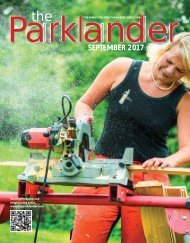May2015
Create successful ePaper yourself
Turn your PDF publications into a flip-book with our unique Google optimized e-Paper software.
HOME<br />
by Brian Van Dam<br />
Best Management Practices for Healthy Lawns<br />
Weeds Be Gone!<br />
L<br />
iving in South Florida means we<br />
should be able to enjoy our lawn<br />
and landscaping all year long. The<br />
South Florida temperatures, humidity,<br />
and rainfall typically create an environment<br />
where your lawn and landscaping<br />
will flourish. However, there are some<br />
environmental impacts that can affect<br />
their health and appearance. What<br />
does that mean? We live within 30 minutes<br />
of the coast. That means in most<br />
areas, we have sandy soil filled with<br />
rock, coral, and sediment. Sandy soil<br />
does not hold onto moisture or nutrients<br />
too well. We also have high winds<br />
and salt air that can cause damage to<br />
plants and trees and can draw moisture<br />
out of the lawn. These are conditions<br />
that are out of our control.<br />
Here are some helpful tips you can<br />
use for maintaining a healthy lawn and<br />
landscape. The tips are called Best<br />
Management Practices, and you can<br />
apply them yourself or pass them on to<br />
your landscaper.<br />
Watering tips: If you have a lot of<br />
shade or see specific weeds like sedge<br />
and dollarweed in the lawn, this can<br />
mean your lawn is getting too much<br />
moisture. Look at your irrigation timing<br />
device to make sure the lawn is only<br />
being watered two times per week, for<br />
about 25 minutes in each zone and<br />
always during the early morning hours,<br />
between 5am and 8am. Also check the<br />
irrigation heads to make sure there is<br />
proper coverage and no overlapping<br />
when in operation. Turn the irrigation<br />
system off when there are frequent<br />
or heavy rains or install a rain shut-off<br />
sensor. If your lawn starts to appear<br />
dry in certain areas, you can add a<br />
little more time to that zone, but do not<br />
increase the frequency. Too much water<br />
or not enough time to dry out will create<br />
conditions ideal for fungus disease.<br />
Mowing tips: The majority of<br />
South Florida lawns have St. Augustine<br />
grass. For this type, the<br />
grass blades should<br />
be maintained at 3” to<br />
4“. You will have better<br />
overall color. Try not to<br />
remove any more than<br />
1/3 of the grass blade<br />
per mowing. Mower<br />
blades should be<br />
sharpened regularly<br />
as this will aid<br />
in a nice clean<br />
cut of the blade<br />
instead of<br />
tearing<br />
it. Mower blades should be cleaned<br />
regularly as well to prevent the spread<br />
of pathogens from one lawn to another.<br />
You can practice “grasscycling” by leaving<br />
the clippings on the ground. Do not<br />
blow clippings into bodies of water or<br />
onto impervious surfaces like sidewalks.<br />
A healthy lawn that is mowed and<br />
watered properly will be better at withstanding<br />
environmental stress and will<br />
also minimize the amount of weeds. You<br />
should trim or prune trees annually or as<br />
needed to minimize wind resistance and<br />
allow enough sunlight to reach shady<br />
areas of the lawn and landscaping.<br />
When deciding what plants to place<br />
around your home, make sure it is the<br />
right plant in the right place. You should<br />
consider sunlight, drainage, irrigation,<br />
and space requirements.<br />
Each property can have unique<br />
circumstances. Remember that<br />
your lawn, landscape, and trees<br />
are all living organisms. They<br />
need proper care and sometimes<br />
protection from insects<br />
and disease. P<br />
Brian Van Dam is a manager<br />
with JP Miller & Sons<br />
Services in Deerfield<br />
Beach.<br />
50 JANUARY MAY 2016 2015


















